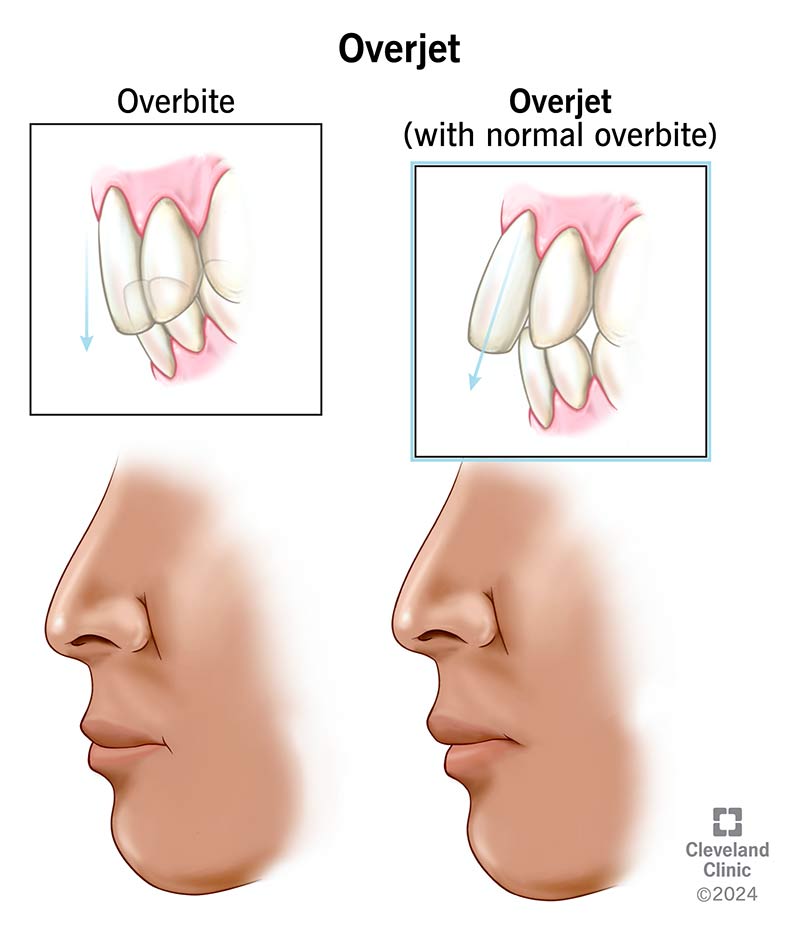Overjet (buck teeth) refers to a type of malocclusion (bad bite). It happens when your upper front teeth stick out further than they should. Overjet (horizontal overlap) differs from overbite (vertical overlap). You can fix overjet with orthodontics or oral surgery.
Advertisement
Cleveland Clinic is a non-profit academic medical center. Advertising on our site helps support our mission. We do not endorse non-Cleveland Clinic products or services. Policy

Image content: This image is available to view online.
View image online (https://my.clevelandclinic.org/-/scassets/Images/org/health/articles/overjet)
Overjet describes a type of malocclusion (bad bite). It happens when your upper front teeth protrude, or stick out, further than they should. Another name for overjet is “buck teeth.”
Advertisement
Cleveland Clinic is a non-profit academic medical center. Advertising on our site helps support our mission. We do not endorse non-Cleveland Clinic products or services. Policy
Most people’s upper front teeth protrude past their lower front teeth by about 2 millimeters. That’s what dentists consider normal. But if your teeth stick out more than 2 millimeters, that’s an overjet.
Appearance is a common concern among people with overjet. Many worry that it negatively affects their smile. But overjet can impact your oral health and function, too. When your teeth don’t fit together properly, it can cause chewing difficulties, jaw pain, headaches and other issues.
You can fix overjet with braces in most cases. But you might need additional orthodontics or jaw surgery if you have severe overjet (8 to 10 millimeters or more).
Many people say “overbite” when they really mean “overjet.” Both terms refer to types of malocclusion, but they’re not the same thing. Overbite refers to vertical distance, while overjet refers to horizontal distance:
Advertisement
Overjet symptoms vary depending on whether your teeth protrude a little or a lot. With overjet, you might have:
Varying factors can cause overjet teeth, including:
Buck teeth (and all types of malocclusion) can cause complications that worsen with age. Left untreated, overjet can result in:
In some cases, overjet can make it harder to brush and floss properly. This can increase your risk for cavities and gum disease.
Sometimes, overjet can contribute to issues with appearance and function. But plenty of people do well without an “ideal” overjet, so it’s not always necessary to treat it.
A dentist can tell you if you have overjet during a dental examination. They’ll measure the horizontal distance between your lower front teeth and your upper front teeth. If your upper teeth protrude further than 2 millimeters, you might have overjet.
Your dentist may also need to take X-rays. Dental X-rays can give them important information about the health of your teeth and gums.
Treatments for overjet include:
Dentists and orthodontists consider many factors when recommending treatment, like your age, how much of an overjet you have and whether your overjet interferes with oral health or chewing function.
You can’t fix overjet without orthodontics or surgery. But if appearance is your main concern, these cosmetic dentistry treatments may camouflage the issue:
Advertisement
It’s important to know that these procedures don’t correct the underlying condition. So, if overjet interferes with health or function, you might need braces or surgery to fix it.
Orthodontic treatment is the only way to fix buck teeth (overjet). They won’t go away naturally over time.
Many people are born with an overjet. In these instances, there’s nothing you can do to prevent it.
These recommendations may help you reduce your child’s risk for overjet:
Tell your dentist any time you develop new symptoms like a toothache, facial pain or pain when chewing. You should also see your dentist for routine cleanings and exams. Preventive dental visits can reduce your risk for overjet-related complications.
If the appearance of your teeth makes you feel embarrassed or self-conscious, treatment can help. In addition to enhancing your smile, treatment can ease symptoms, improving your overall oral health and quality of life. If you have overjet, ask your dentist about ways to correct it. Treatment may be easier than you think.
Advertisement

Sign up for our Health Essentials emails for expert guidance on nutrition, fitness, sleep, skin care and more.
Learn more about the Health Library and our editorial process.
Cleveland Clinic’s health articles are based on evidence-backed information and review by medical professionals to ensure accuracy, reliability and up-to-date clinical standards.
Cleveland Clinic’s health articles are based on evidence-backed information and review by medical professionals to ensure accuracy, reliability and up-to-date clinical standards.
Dentistry plays an important role in oral health. Cleveland Clinic’s experts can design a personalized plan that will keep you smiling for the long haul.
